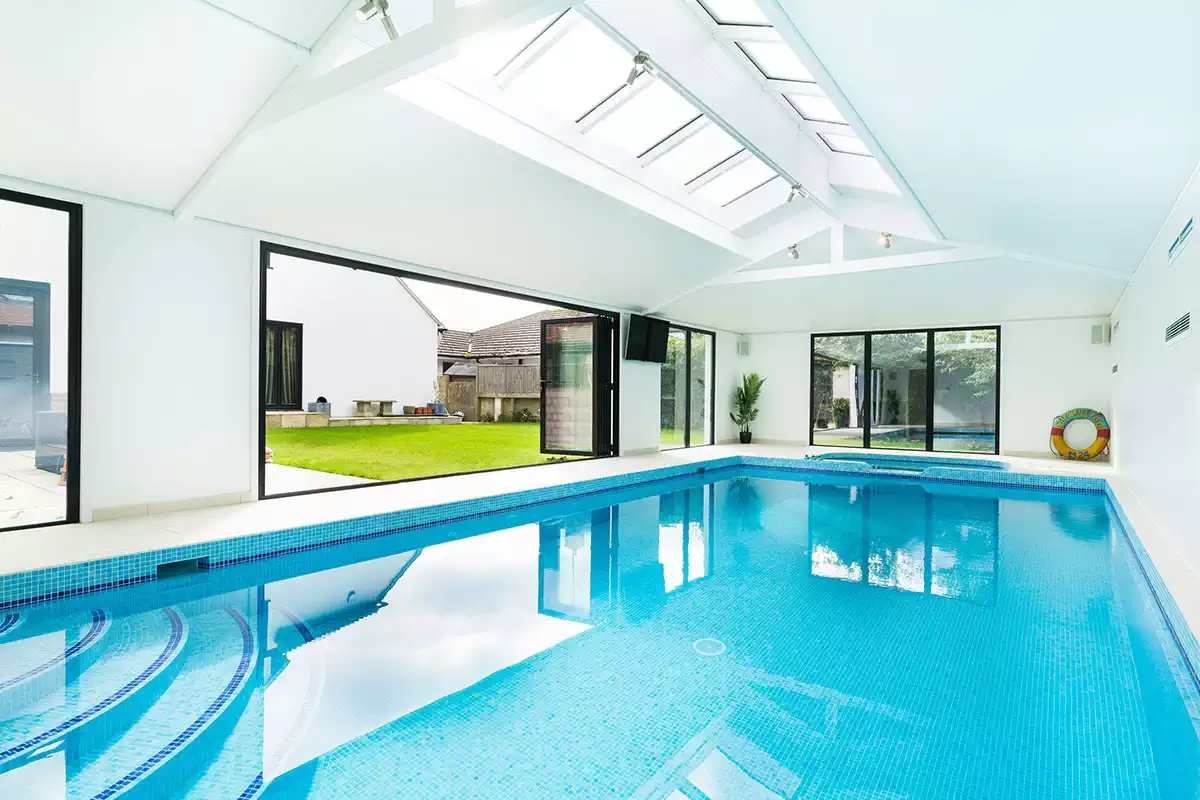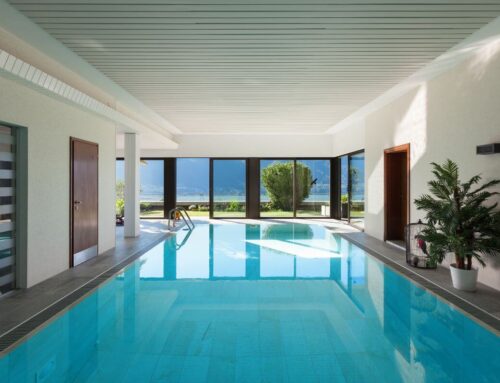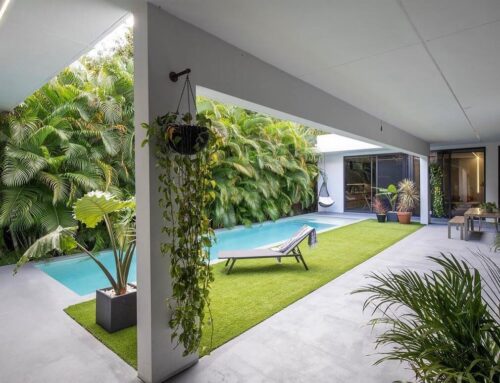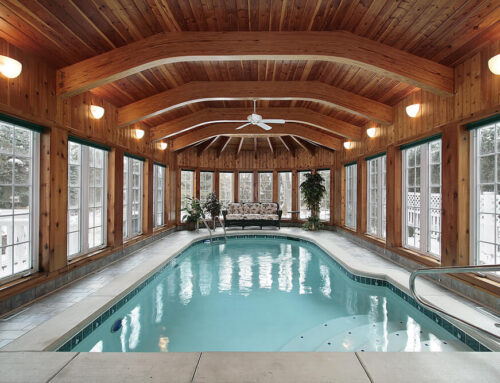Considering an indoor pool in Miami? Awesome! We’ve seen lots of indoor pool projects over the years, and we know folks often have a bunch of questions at the start. We’re here to help! We’ll tackle the questions we hear most often from people worldwide who connect with us online. Let’s dive in!
What Are the Advantages and Disadvantages of Owning an Indoor Pool?
Advantages
- Swimming all year round
- Maintenance is reduced as debris from the outside does not enter the pool
- Use less chemicals as sunlight doesn’t reduce chlorine/sanitizer levels
Disadvantages
- Construction costs are substantially higher
- Heating the pool and airspace now requires higher energy costs
- Sunbathing is not permitted in direct sunlight
GET A FREE QUOTE
CONTACT US AT (305) 590-5263
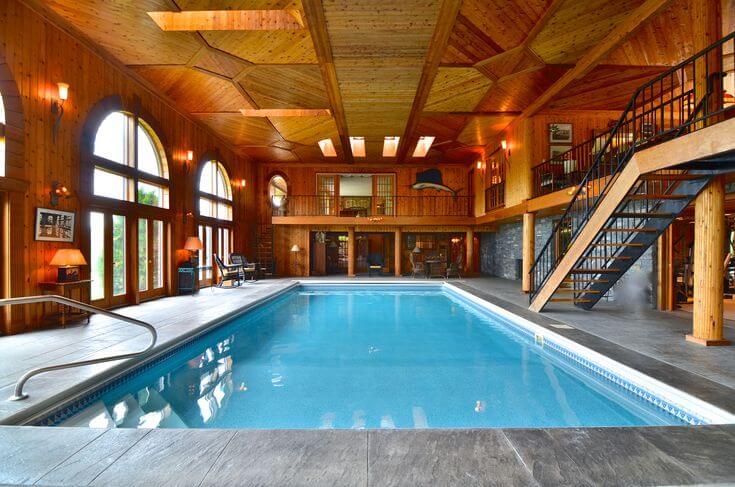
How Much Do Indoor Swimming Pools Cost?
According to our experience, an indoor swimming pool in the United States can cost as little as $200,000 or even more.
Why is it so expensive? Let’s look at a quick price breakdown:
- A swimming pool costs between $40,000 and $60,000.
- Imagine you want to build a structure measuring 25’x45″ (1125 sq ft), and that the average cost is $100 per square foot. The structure would cost $112,500.
- Install a Dehumidification System to protect your structure from moisture damage. This will cost between $20,000 and $30,000.
The total cost of this hypothetical project is $187,500 if we choose the middle price range.
Is It Possible to Build the Pool Now and Enclose It Later?
Absolutely! Planning your project is crucial for success.
Start by laying the groundwork for your future structure. Pour the pool deck even before you finalize the size. Before doing that, make sure to rough in all the water and electrical lines needed for the construction ahead.
What Pool Accessories Should I Consider With an Indoor Pool?
Automatic Pool Covers
Thinking about automatic covers for your outdoor pool? It might be a tough call. But for indoor pools, they’re almost a must-have.
Keeping humidity in check is super important for any pool. Automatic covers play a big role by stopping water from evaporating and helping to maintain the water level in your pool. Plus, they save energy by keeping the pool water warm.
Pool Heater
Indoor swimming pools are not heated by direct sunlight and therefore require a different method to do so. A natural gas or propane pool heater is the traditional indoor pool heater.
What Type of Swimming Pool Is Best Indoors?
Inground pools come in three main types: concrete, fiberglass, and vinyl liner. While we focus on fiberglass pools, any of the other two types can also be used for an indoor pool.
One big advantage of fiberglass pools is how quickly they can be installed. The pool shell can be set up in just a few days, cutting down on the time needed to finish the whole structure. The smooth surface of fiberglass pools also makes swimming more enjoyable.
We’ve put together a fair comparison among vinyl liners, fiberglass, and concrete pools.
If an Indoor Pool Isn’t in My Budget, What Other Options Do I Have?
Not everyone can have an indoor swimming pool, but many folks have created the perfect outdoor pool for their families. Once the project is done, most wouldn’t change a thing.
Lots of people like using certain pool accessories to make their outdoor swimming experience even better. Automatic covers, for example, trap the sun’s heat, make maintenance easier, and keep the pool clean from debris. Pool heaters are also popular because they let you swim for a longer season and give you control over the water temperature.
These options are smart investments. They bring real benefits without costing as much as enclosing your pool. We hope this info has been useful!
Choose Your Indoor Swimming Pool Builder Wisely
Choosing the right company for your indoor pool design and construction is important. Indoor pools are naturally humid, but too much humidity can cause problems like windows rotting or getting foggy, and the air feeling steamy and unpleasant. When indoor pools need fixing, it can be frustrating for hotel owners and homeowners.
Excess humidity usually happens because of design errors, choosing the wrong pool materials, or mistakes in the design and build process. The pool builder you pick should understand four basic indoor pool principles: water chemistry and air distribution, mechanical components, and architecture. Any mistake in one part can affect the whole project and the other parts.
Architecture and Construction of Indoor Swimming Pools
Many indoor pools in hotels and resorts are poorly designed, with lots of mistakes in how they’re installed and obvious shortcuts taken. This can turn the whole pool area into a moldy, unhealthy mess. Builders run into these problems when they take on projects outside their expertise. They might plan for normal conditions but forget that indoor pools have a constant temperature of 85 degrees with a 60-degree dew point.
Think about the indoor pool atmosphere like the worst days in August, it changes the whole project. Constructing indoor pools for businesses or homes needs a skilled builder who understands the unique challenges of these environments.
The Importance of Vapor Barriers
People often overlook or choose poor-quality vapor barriers. Sometimes, they’re not installed correctly, or they’re missing altogether. It’s crucial to use the highest-quality barrier and make sure it’s installed properly. The choice of barrier can determine whether you end up with issues like mildew, mold, and rotting wood.
Windows for Your Natatorium
Most indoor pools have windows, and it’s crucial to pick ones that can handle the tough pool environment. Choose windows that are triple- or double-paned to lessen condensation. Avoid condensation to keep the other building materials dry throughout the year.
Air Flow Within Your Indoor Swimming Pool Environment
Air quality and dehumidification are crucial in a well-designed and built indoor pool. These systems function like powerful air conditioners, but instead of releasing chilled air, they release warm, dry air. They’re made to handle higher humidity levels. However, no matter how big or pricey your system is, it won’t work effectively if the air doesn’t circulate at the right angles and in the right places.
Having high humidity around your indoor pool can lead to water condensation due to high dewpoints. This can be prevented by keeping surfaces warm.
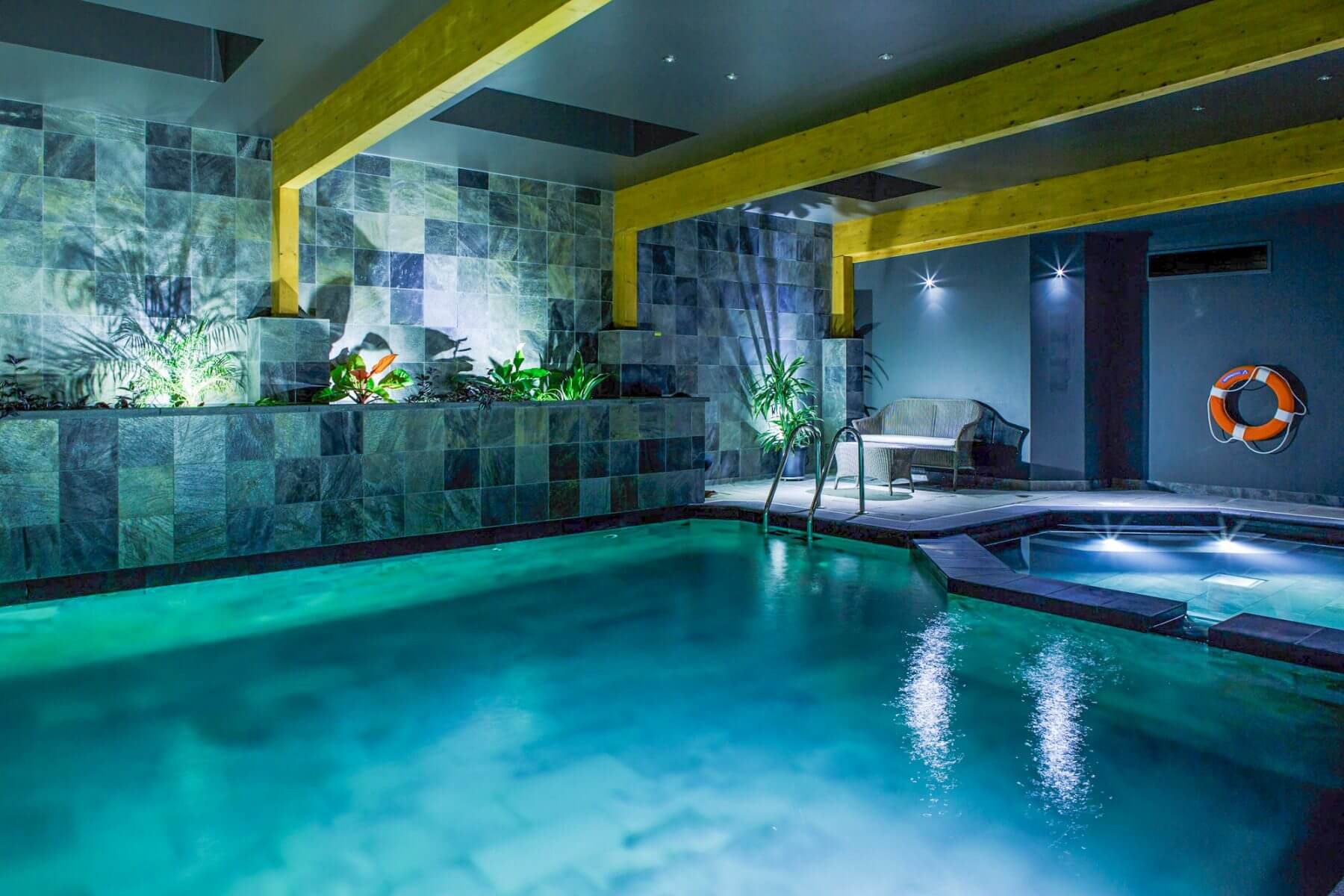
Choosing the Best Equipment for Your Indoor Swimming Pool
Firstly, we consider the size of the area and the outdoor temperature. But we also think about how homeowners or resort operators plan to use the room. Typically, the design is based on a 4-degree difference in temperature between the air and water – for example, 80 degrees air and 84 degrees water. If the homeowner or resort manager prefers a different balance, like 75-degree air with 88-degree water, it can significantly affect the calculations for dehumidifier size and evaporation rate.
Once the equipment is ordered, the hotel operator and homeowner must know that the atmosphere temperature and the pool water set point are set together.
Indoor Swimming Pool Chemistry
The last crucial aspect of an indoor pool is water chemistry. Even though it seems simple, not keeping it in check can lead to big problems. If we’re not taking care of your indoor pool, we can set up a schedule for water chemistry. It’s important never to store pool chemicals in a mechanical room or an unventilated cupboard.
Some indoor pool builders in Miami might offer a low-priced quote to win your business but be cautious. You might end up spending more money fixing problems than if you had chosen a more experienced company. Remember, don’t go for a cheap swimming pool company if you plan on installing an indoor pool.
Choosing a company that cuts corners may seem like a better deal initially, but the cost difference between doing things right and wrong is much less than replacing walls, and windows, dealing with mold, or fixing equipment.
Elevate Your Miami Experience with an Indoor Pool
Escape the unpredictable Miami weather and enjoy year-round swimming with an indoor pool from Florida Pool Patio. Our experienced pool builders will design and construct a custom indoor pool that perfectly complements your home and lifestyle.
With an indoor pool, you can:
- Swim laps, practice water aerobics, or simply relax and enjoy a refreshing dip
- Host pool parties and gatherings regardless of the season
- Create a tranquil oasis for yourself and your family
Florida Pool Patio is your one-stop shop for all your indoor pool needs. We offer a wide range of services, from pool design and construction to maintenance and repair. Our team of experts is dedicated to providing you with the highest quality service and workmanship.
Contact us today to schedule a consultation and start planning your dream indoor pool in Miami, FL.
Visit our website or call us at (305) 590-5263 to learn more.
Services We Offer:

